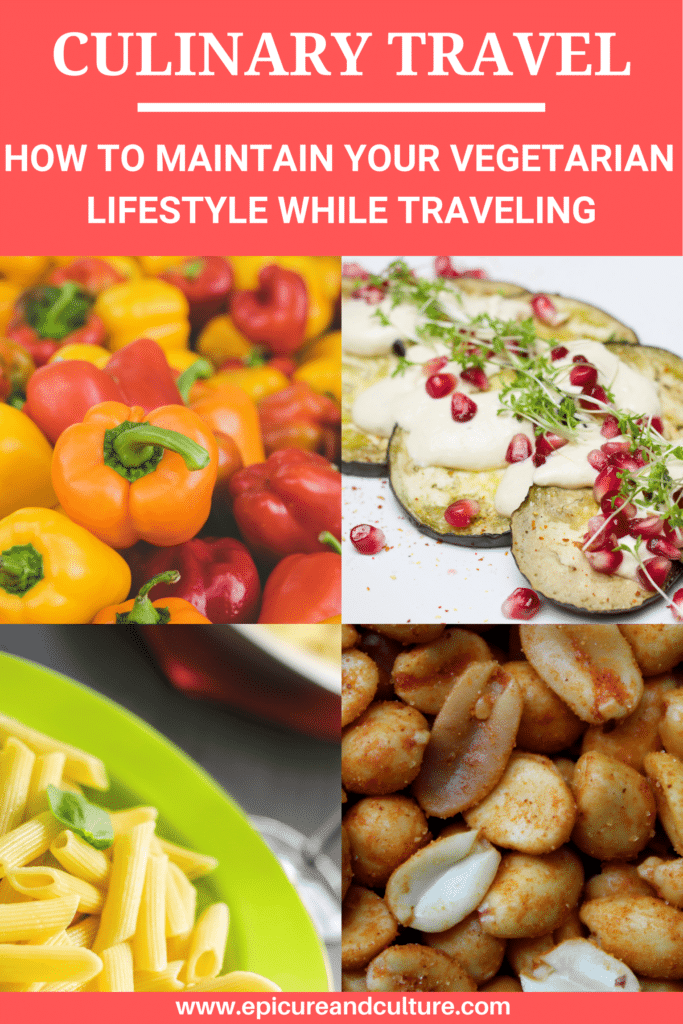In honor of World Vegetarian Day on October 1 — the kickoff to Vegetarian Awareness Month — here’s an exploration of how travelers committed to the vegetarian diet and lifestyle can partake in the pleasures of travel, especially the culinary ones.
What are the benefits of being a vegetarian traveler?
A Taste of Health aptly states that “[v]egetarian and vegan travel [gives] people the opportunity to travel responsibly in a way that is aligned with the principles to which they adhere in daily life.”
While some might see vegetarianism as a mere dietary choice, vegetarianism (and veganism) can actually be extended to a larger collective effort to be responsible stewards and citizens at home and abroad, supporting choices, practices, and vendors that are ethically and environmentally sound.

How can one incorporate a vegetarian diet while traveling?
Across the board, experienced vegetarian travelers recommend doing your homework and planning ahead.
On a large scale, this might mean choosing destinations that are inherently vegetarian-friendly (see below). Keep in mind, too, that even typically meat-heavy destinations are adapting the lifestyle; just check out this delicious guide to vegetarian and vegan food in Mexico, for instance.
On a smaller scale, travelers can consider shopping at local farmers’ markets, preparing their own meals when possible, grazing throughout the day instead of relying on large meals for sustenance, and researching restaurants ahead of time to have a vegetarian-friendly itinerary in place before the trip begins.
What countries are great for vegetarian travelers?
Fortunately, the list of vegetarian- and vegan-friendly destinations is far-reaching. Foremost, travelers might consider destinations in which the culture tends to support meat-free and/or produce-rich foodways, such as the Middle East and the Mediterranean.
More specifically, CNN recommends places like Glasgow, Seoul, Vancouver, Austin, Kuala Lampur, and Chennai (India).
PETA’s list of vegan-friendly lodgings include sites in Australia, South Africa, Guatemala, England, and Peru. Clearly, vegetarian-friendly travel can be global in scope.

How can you lessen the meat you eat while still getting protein?
As mentioned above, planning ahead is key.
A misstep in avoiding meat can often mean shortchanging nutrition; travel experts and dietitians alike encourage travelers to keep healthy snacks on hand to prevent this from happening. Recommendations include seeds, nuts, bars, protein powder, and other superfoods.
Travelers might also consider supplemental vitamins and minerals to be sure they are getting the necessary daily values they need.
How can travelers handle situations in which vegetarianism is uncommon, misunderstood, or seen as offensive?
Travelers may want to avoid destinations in which meat is the culinary mainstay (the Huffington Post has even drawn up a list of the worst places for vegan travel).
Ironically, many vegetarian travelers recommend avoiding using the word “vegetarian” altogether, since it may not have a translatable language equivalent, or because it often carries a negative connotation in other cultures.
Instead, try explaining what you can’t eat, request dishes heavy with vegetables, and spend time learning the food vocabulary of the country’s language. “Fluent in 3 Months” blogger Benny Lewis makes a great case for presenting your vegetarian needs in a culturally respectful way:
If you are a vegetarian for moral reasons then you have to be very careful about how you express this. Do not try to convert foreigners to vegetarianism or present your case with moral superiority. This concept is simply not (currently) compatible with many cultures and you will actually offend a lot of people simply by not eating their local food or suggesting that animals are suffering for their lunch. Learning how to present your case in a logical way and being ready for the typical retorts will help people to respect your dietary decision. But when abroad, the goal should primarily be to gain respect and much less be one of convincing people.

What apps, tools, and websites are out there to assist vegetarian travelers?
Plenty!
One of the most frequently recommended is HappyCow, which also has an app for mobile devices. Other apps worth checking out are VegOut, VeggiePassport, and, of course, Yelp. The Vegetarian Resource Group, Green Earth Travel, Chowhound, and VegVoyages are also worth perusing.
Additionally, plenty of digital communities of vegetarians and vegans (especially on HappyCow) brimming with savvy advice are just a few clicks away.
While vegetarian travel may require a bit more homework and planning ahead, ample resources are available to ensure that travelers can maintain their home lifestyle abroad and enjoy their meals along the way.
Enjoyed this post? Pin it for later!
Also Check Out:
The New Becoming Vegetarian: The Essential Guide To A Healthy Vegetarian Diet by Vesanto Melina MS RD [Essential Reads]
Conscious Travel: Best Vegetarian Bed And Breakfasts Around The World [Blog Inspiration]
The Anywhere Travel Guide [Travel Fun]
Latest posts by Paige Sullivan (see all)
- Holiday Treats & Christmas Traditions Around The World - Dec 19, 2016
- Handouts In Developed Nations: Advice For The Responsible Traveler - Jun 7, 2016
- 5 Immersive Culinary Enclaves To Savor In NYC - Feb 18, 2016
- Traveling Responsibly & Protecting Fragile Environments - Jan 9, 2016
- Can Tiger Tourism Be Responsible? - Jan 9, 2016







Travelling made me become vegetarian – however, I was travelling South East Asia, where we found maintaining a vegetarian lifestyle was very easy (especially in Chiang Mai, where the vegan food was spectacular!).
Since then, I have visited a number of places (mainly in Europe and the US) and have found that being vegetarian has made eating abroad much more fun. I’m trying food that I’ would never have tried before.
I’m sure at some point it will become more of a challenge when we visit somewhere where there are more language and cultural barriers. But becoming vegetarian was the best choice I’ve made and I’m looking forward to discovering more vegetarian food around the world!
@Karianne: Agreed about the vegetarian food in Southeast Asia. AMAZING!
Plan in advance and look up food market locations near your accommodation in the destinations you’re traveling. It’s always good to have fresh fruit and veggies mapped out in case you find that you’re filling up on bread and unhealthy food. It’s always good to have a backup plan in case your dining options are limited.
@John: Great tip! This can definitely save travelers a lot of hassle and disappointment on the road.